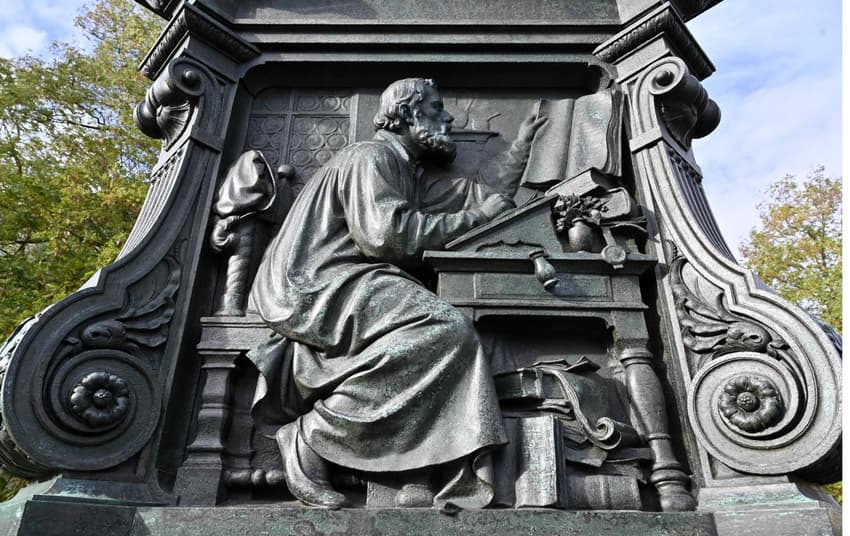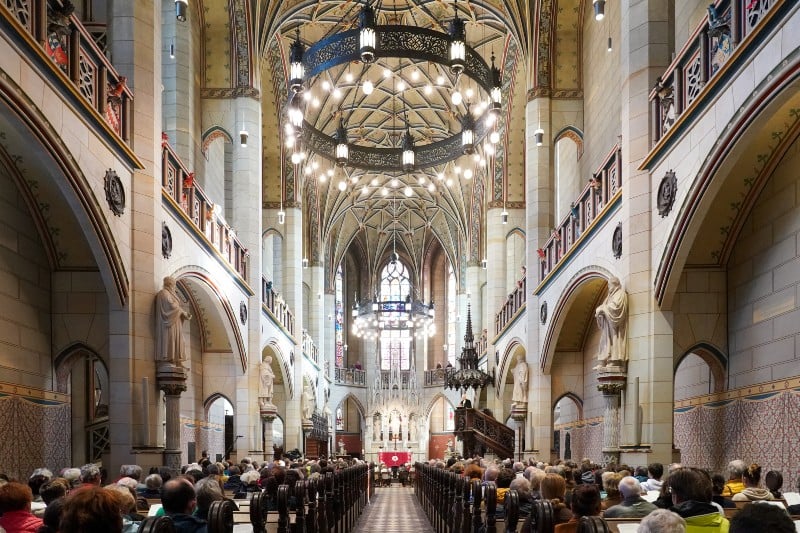Why all German states except Berlin and Hesse have a holiday next week

All German states except Berlin and Hesse can look forward to a public holiday on either Tuesday, October 31st or Wednesday, November 1st.
When many younger people in Germany think of the date October 31st, the imported holiday of Halloween is the first festive occasion which comes to mind.
But the day is also a Feiertag (public holiday) in eight states, whereas the following day is a day off work for an additional six states.
Only Hesse and Berlin do not have October 31st or November 1st as public holidays.
Since Reunification, Reformation Day (Reformationstag) on October 31st has been a public holiday in the German states of Brandenburg, Mecklenburg-Western Pomerania, Saxony, Saxony-Anhalt and Thuringia - and since and since 2018 also in Lower Saxony, Bremen, Hamburg and Schleswig-Holstein.
In contrast, All Saints' Day (Allerheiligen) on November 1st is observed in the Catholic Catholic states of Bavaria, Baden-Württemberg, North Rhine-Westphalia, Rhineland-Palatinate, North Rhine-Westphalia, Rhineland-Palatinate and Saarland. and in many other countries such as Austria, Belgium, France, Italy, Poland, Portugal and Spain.
Germany’s churches continue to take a critical view of the creepy celebrations on the last day of October, which every year see more Germans heading to costumed events and even trick-or-treating like their North American counterparts.
READ ALSO: The best place to celebrate Halloween in each German state
Catholics fear that the fun will spoil their commemoration of the dead on All Saints' Day
All Souls' Day (Allerseelen), is not a public holiday, but takes place the following day on November 2nd, as it does in many other parts of the world.
Some protestants feel like their commemoration of Martin Luther’s Reformation is being overlooked.
What does Reformation Day celebrate?
The holiday can be traced back to Martin Luther, an academic and religious figure who was strongly against the corruption of the Catholic Church in the 16th century.
Around this time, the church was heavily involved in the politics of the Holy Roman Empire and the practice of selling 'indulgences' was becoming increasingly common.
This meant those who felt they had sinned could simply buy a pardon and, in exchange for their money, a prayer would be said or a candle lit to 'absolve' them of their sins.
 A church service in 2021 in Wittenberg, Saxony-Anhalt marked the 504th anniversary of the Reformation. Photo: picture alliance/dpa/dpa-Zentralbild | Peter Endig
A church service in 2021 in Wittenberg, Saxony-Anhalt marked the 504th anniversary of the Reformation. Photo: picture alliance/dpa/dpa-Zentralbild | Peter Endig
These pardons were essentially religious 'get out of jail free cards' and the more money people paid for them, supposedly the more years were taken off their time in purgatory .
Increasingly resentful of the ways of the Catholic Church, Martin Luther published his 95 Theses on October 31st, 1517, attacking the corrupt practices of the papacy and essentially sparking the biggest revolution the Christian faith has ever seen.
What is All Saint’s Day?
Not surprisingly on All Saints’ Day, people commemorate the saints of the Catholic Church. The day has its roots in the fourth century, when it was becoming increasingly difficult to celebrate all of the saints with their own day.
Pope Gregory III then decided that all the martyrs of the Church should be commemorated in Rome on November 1st..
Then, in the eighth century, this day was extended to the entire Western Church.
In total, the Catholic Church knows almost 7,000 saints.. During the pontificate of Pope John Paul II alone, 482 people were canonised.
All Saints' Day is one of the high points of the Catholic Church. These high points in the church year also include Christmas, Easter, Ascension Day and Pentecost.
On All Saints' Day, there is a particularly solemn liturgy in Catholic churches, in which the clergy wear white vestments on this occasion, illustrating the purity and joy of the feast.
Comments
See Also
When many younger people in Germany think of the date October 31st, the imported holiday of Halloween is the first festive occasion which comes to mind.
But the day is also a Feiertag (public holiday) in eight states, whereas the following day is a day off work for an additional six states.
Only Hesse and Berlin do not have October 31st or November 1st as public holidays.
Since Reunification, Reformation Day (Reformationstag) on October 31st has been a public holiday in the German states of Brandenburg, Mecklenburg-Western Pomerania, Saxony, Saxony-Anhalt and Thuringia - and since and since 2018 also in Lower Saxony, Bremen, Hamburg and Schleswig-Holstein.
In contrast, All Saints' Day (Allerheiligen) on November 1st is observed in the Catholic Catholic states of Bavaria, Baden-Württemberg, North Rhine-Westphalia, Rhineland-Palatinate, North Rhine-Westphalia, Rhineland-Palatinate and Saarland. and in many other countries such as Austria, Belgium, France, Italy, Poland, Portugal and Spain.
Germany’s churches continue to take a critical view of the creepy celebrations on the last day of October, which every year see more Germans heading to costumed events and even trick-or-treating like their North American counterparts.
READ ALSO: The best place to celebrate Halloween in each German state
Catholics fear that the fun will spoil their commemoration of the dead on All Saints' Day
All Souls' Day (Allerseelen), is not a public holiday, but takes place the following day on November 2nd, as it does in many other parts of the world.
Some protestants feel like their commemoration of Martin Luther’s Reformation is being overlooked.
What does Reformation Day celebrate?
The holiday can be traced back to Martin Luther, an academic and religious figure who was strongly against the corruption of the Catholic Church in the 16th century.
Around this time, the church was heavily involved in the politics of the Holy Roman Empire and the practice of selling 'indulgences' was becoming increasingly common.
This meant those who felt they had sinned could simply buy a pardon and, in exchange for their money, a prayer would be said or a candle lit to 'absolve' them of their sins.

These pardons were essentially religious 'get out of jail free cards' and the more money people paid for them, supposedly the more years were taken off their time in purgatory .
Increasingly resentful of the ways of the Catholic Church, Martin Luther published his 95 Theses on October 31st, 1517, attacking the corrupt practices of the papacy and essentially sparking the biggest revolution the Christian faith has ever seen.
What is All Saint’s Day?
Not surprisingly on All Saints’ Day, people commemorate the saints of the Catholic Church. The day has its roots in the fourth century, when it was becoming increasingly difficult to celebrate all of the saints with their own day.
Pope Gregory III then decided that all the martyrs of the Church should be commemorated in Rome on November 1st..
Then, in the eighth century, this day was extended to the entire Western Church.
In total, the Catholic Church knows almost 7,000 saints.. During the pontificate of Pope John Paul II alone, 482 people were canonised.
All Saints' Day is one of the high points of the Catholic Church. These high points in the church year also include Christmas, Easter, Ascension Day and Pentecost.
On All Saints' Day, there is a particularly solemn liturgy in Catholic churches, in which the clergy wear white vestments on this occasion, illustrating the purity and joy of the feast.
Join the conversation in our comments section below. Share your own views and experience and if you have a question or suggestion for our journalists then email us at [email protected].
Please keep comments civil, constructive and on topic – and make sure to read our terms of use before getting involved.
Please log in here to leave a comment.